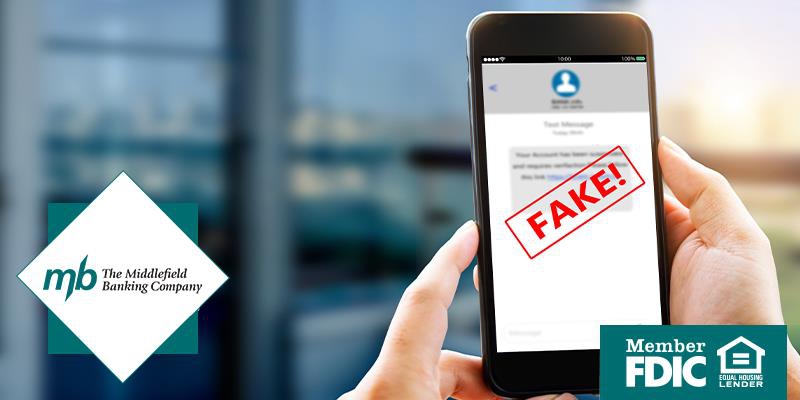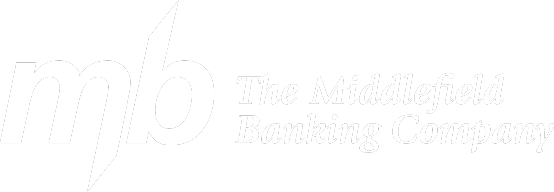Common Types of Bank Account Fraud
Posted On: May 23, 2023 by The Middlefield Banking Company in: Cybersecurity

As we increasingly rely on the internet and mobile devices to manage our financial transactions, the risk of cybercrime also continues to rise. From paying bills to sending money to family and friends, there are numerous options available that make it easier for scammers to raid your bank account. However, there are ways to keep your accounts safe and secure from common types of bank fraud. Keep reading to learn more.
Check Fraud
This type of fraud involves illegal attempts to obtain your money through a check. It has become less common to use paper checks with the online and mobile banking options available today. It’s said that most people still write 3-5 paper checks per month.
Here are some examples of check fraud:
o Creating fake checks.
o Check washing: Replacing the original information on a check with new information.
o Check kiting: Writing a check for an amount greater than what’s in the account and depositing it at another bank.
o Forgery: Signing and using a check without permission.
Here are some ways to avoid check fraud:
o Investigate suspicious checks.
o Reach out to the bank if the check is legitimate.
o Avoid overpayment scams.
o Never pay for a prize.
o Don’t write a check to someone whom you do not know or trust.
o Report any sign of check fraud to your bank immediately.
Peer to Peer Payment Fraud
Peer-to-peer payment (P2P) scams most commonly happen between people using services such as Zelle, Venmo, Paypal and Cash App. This does not mean that you should stop using these apps, but rather is a friendly reminder that you need to be extremely careful as to how you utilize them. When sending money through these services, the money typically goes from one person’s checking account to the others.
Here are some ways to avoid P2P scams:
o Only send money to people who you know and have confirmed an account for.
o Do not send large amounts of money using these services all at once.
o Use a credit card rather than a bank account if you are able.
o Do not leave money in your account for these services for a long period of time—try to transfer it as soon as possible.
o If you think you may be experiencing a scam, notify your bank immediately.
o Keep your passwords updated and unique to ensure no one has hacked into your account.
ATM Skimming
ATM skimming is when scammers use people’s credit or debit card information by putting hidden devices on ATMs. This could also be possible at payment terminals like those at gas stations. The hidden devices are an overlay installed over the card insertion slot that allows the thief to obtain the data on the card’s magnetic stripe. Once the card information is obtained, these scammers use this to create fake cards and withdraw your money.
Here are some ways to avoid ATM skimming:
o Opt for cardless ATM transactions.
o Withdraw cash from your bank directly or utilize their ATM.
o Pay attention to an ATM’s card reader.
o Report any fraudulent transactions to your bank immediately.
Phishing Scams
Phishing scams are cyberattacks made by scammers that involve tricking a user into sharing their login credentials or other personal information that may be sensitive to their accounts. Phishing scammers insert malware into a text or an email, allowing them to steal your information if you click a link or download an attachment. These emails are designed to look like they are coming from a familiar person you’d trust, such as your bank, service providers, or even someone you know personally.
Here are some ways to avoid phishing scams:
o Be aware of phishing messages, calls and emails that look like they’re from your bank.
o Never click on links in emails or text messages.
o If you have questions about whether or not the email/call/text is legitimate, call the bank phone number on the back of your debit card.
o If it looks like a scam, there is a good chance it may be.
o Report phishing scams.
o If you receive a phishing attempt, change your passwords.
Wire Transfer Fraud
Scammers will use wire transfer fraud because this type of fraud makes it incredibly hard to recover funds. Some of these wire transfer scams include family emergency scams, dating app scams, and classified ad schemes.
Never wire money to anyone you haven’t met in person, who pressures you to send money immediately, especially if they claim to work for a government agency such as the IRS or Social Security Administration.
Here are some ways to avoid wire transfer fraud:
o If you are going to wire transfer money, do it through your bank.
o If you recognize a sign of wire transfer fraud, report it to your bank immediately.
Bank account fraud can happen to anyone, anywhere, so it’s important to protect your money by being aware of common scams and reporting them immediately to your bank to avoid further issues with your bank accounts. If you have questions, please contact The Middlefield Banking Company today!

0 comments